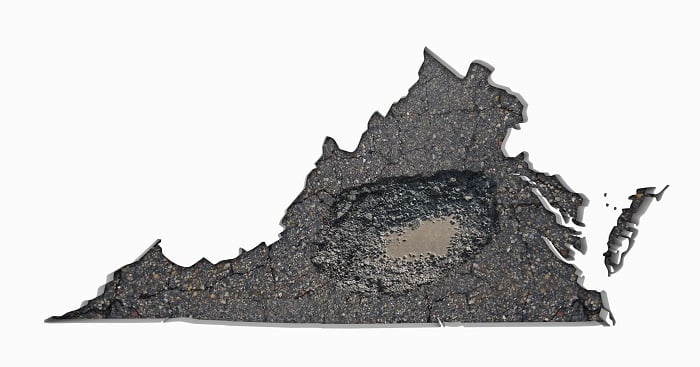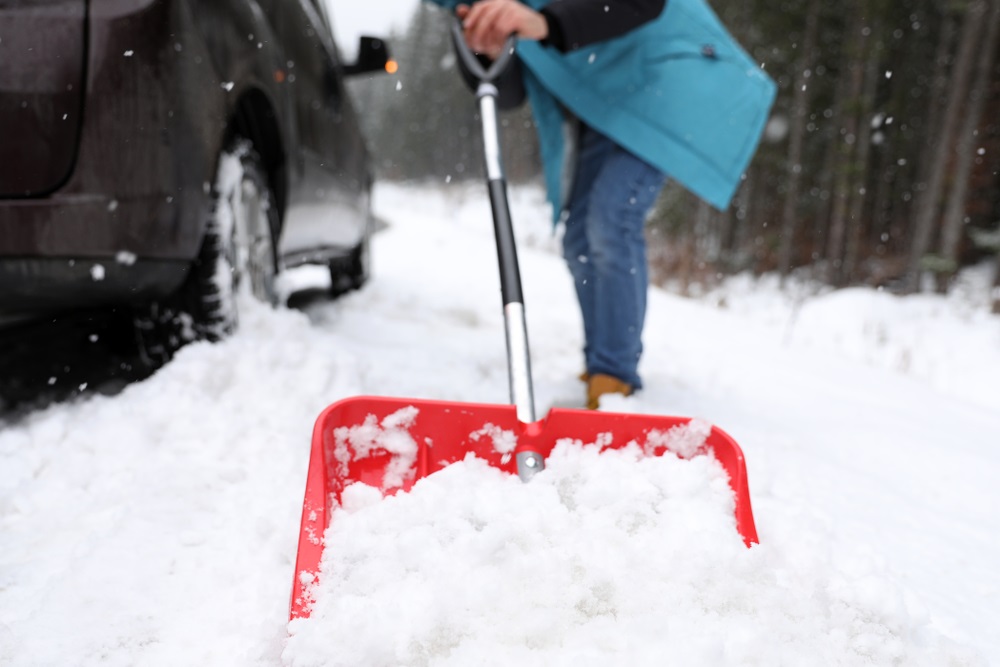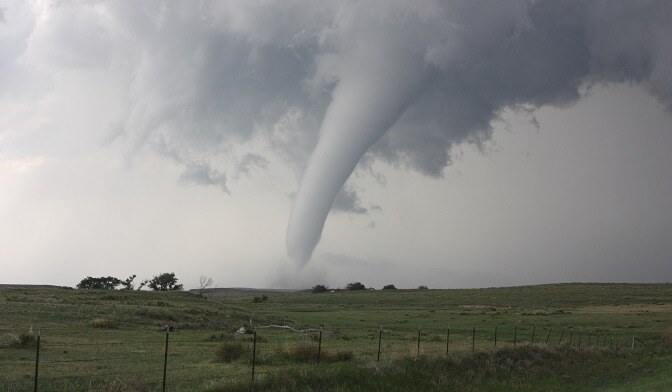
Are tornadoes common in Virginia?
Virginia is no stranger to tornadoes. Researchers at Old Dominion University have even identified a primary "Tornado Alley" in eastern and northern Virginia, including Richmond, the Tidewater region, and Northern Virginia. The number of mobile homes in Bedford, Franklin, and Pittsylvania Counties makes those communities a "highest risk" region. Peak months for tornadic activity in the commonwealth are March through May, but tornadoes can also occur anywhere throughout the summer months and peak hurricane season in the fall. Start preparing for a tornado by knowing your area's risk.
On April 15, 2018, a tornado traveled 25 miles from Campbell County through Lynchburg and Amherst County. The damages in Amherst County alone exceeded $6 million, flattening giant trees like toothpicks and damaging homes and businesses.
Tornado Safety at Home
There are many ways to prepare for tornado season. Your family's safety is your priority so staying in touch with your local weather is as important as having a good plan in place. Sign up for your community's alert system and alerts through the Emergency Alert System (EAS). NOAA Weather Radio also provides emergency alerts. If your community has sirens, then become familiar with the warning tone. Do not wait until you physically see the tornado to begin sheltering. Here are more helpful tips:
Tornado Safety in a Home With No Basement
If your home doesn’t have a basement, move to the smallest inside room without any windows or outside walls on the lowest floor, such as a bathroom or closet. Use pillows, blankets, or a mattress to protect your body. The CDC also recommends sheltering underneath something sturdy like a heavy table or workbench for added protection.
You may have heard bathtubs are a safe location inside your home to take shelter during a tornado. If your bathroom lacks windows and is surrounded by interior walls, it may be a suitable alternative location if you don't have a basement. The space underneath a stairwell may also be used as a shelter because it is usually a very strong part of the house.
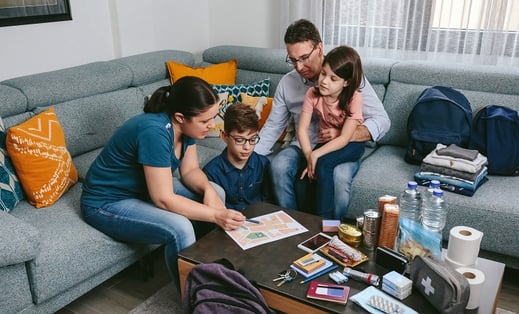
Tornado Safety for Family Members With Disabilities
If someone in your family has disabilities or special needs, make sure you have a specific plan in place for sheltering well in advance. If your loved one is unable to move from a bed or a chair, use any blankets, pillows, or similar items for protection from broken glass or projectile objects.
Tornado Safety in Your Car
We all know the best thing to do when severe weather threatens is to stay at home or work until it's safe to travel, but there are times when encountering a tornado on the road can not be avoided. If you're driving and hear a tornado warning in the area, NOAA suggests getting off the road to a proper shelter immediately. Do not try to outrun a tornado. They have intense winds over 200 miles per hour. Try parking close to a sturdy building and watch for flying debris when leaving your car, using your arms to protect your head and neck.
If you are in a car or outside and cannot get to a building, you're safest in a low, flat location. Cover your head and neck with your arms and cover your body with a coat or blanket, if possible.
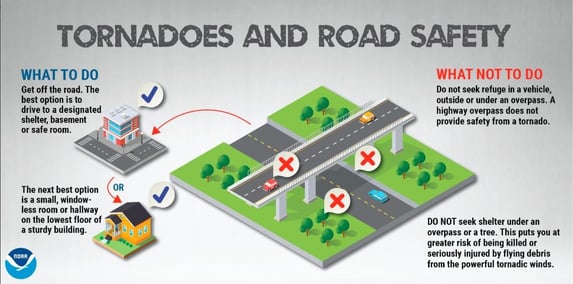
How to Prepare Your House for a Tornado
Prepare Your Trees
While tornadoes can be highly destructive, there are things you can do to prepare your home. Trees are common sources of home insurance claims for causing damage during severe weather. Remove dead or diseased trees and damaged or weak limbs and trim any overhanging branches close to any structure. Look for signs a tree might be susceptible to falling and determine if it needs to be removed before it can cause trouble.
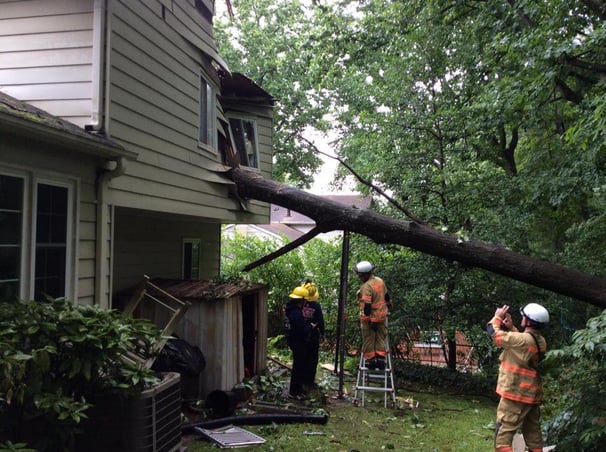
Prepare the Outside Your Home
Identify anything that could become a possible projectile with strong winds or a tornado. Remove heavy debris like branches, bricks, or firewood surrounding your home. Consider creating a list of outdoor items to bring inside in the event of a tornado warning to make last-minute preparation quick and easy. These items may include patio furniture, play equipment, grills, trash cans, or even plants and bird feeders to avoid damage to them and your home.
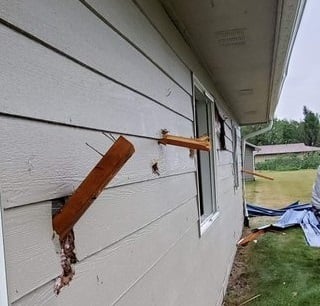
Close Exterior and Interior Doors
When you are alerted to a tornado watch, close all exterior doors and windows and your garage door if you have one. Next, close all the interior doors inside your home. Strong winds can create severe pressure inside your home. Closed doors help disperse that pressure reducing the effects that force can have on your roof during severe weather. They also provide added barriers to flying debris.
Is Tornado Damage Covered by Home Insurance?
Tornado coverage usually does not require special insurance and includes dwelling insurance within a homeowners policy that covers the physical structure of a house. Personal property coverage in your home insurance pays to replace or repair your belongings if they are damaged.
How to Prepare Your Car For a Tornado
You can protect your car from tornado damage by parking it in a garage or another covered parking area. If you have to park in an open area try to find a spot on the side of a large sturdy building and avoid large trees and power lines.
It's also a good idea to fill up your gas tank if you know severe weather is possible. The aftermath of a tornado can stress transportation. Having a full tank of gas is ideal in case you get stuck in traffic during an evacuation call and will help you avoid long queues at the gas station.
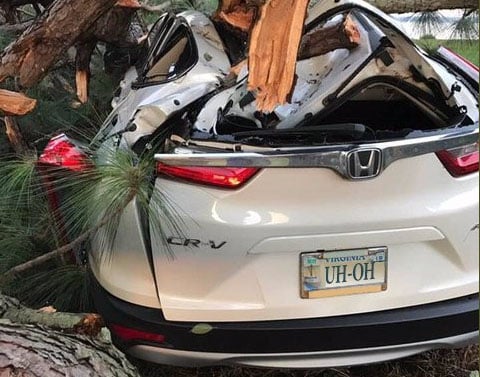
Is Tornado Damage Covered by Car Insurance?
Tornado damage to your vehicle can be covered by your car insurance policy with optional comprehensive car insurance. This coverage provides protection for problems such as tornadoes, fire, hail, theft, falling objects, vandalism, and collisions with animals. Comprehensive auto insurance also covers flood damage to your car. Check with your local insurance agent to make sure you have comprehensive coverage or if it makes sense to add it to your insurance portfolio.
We hope you don't experience a tornado but if you do, we will partner with your local agent to get you back on your feet. Safely take the first steps after severe weather and report your claim to get the process started. We look forward to serving you.
Learn more about homeowners insurance in Virginia >
THE NORTHERN NECK INSURANCE INTEGRITY PROMISE — We pledge to provide straight talk and good counsel from our NNINS Virginia insurance experts through our blog. While we hope you find this to be a helpful source of information, it does not replace the guidance of a licensed insurance professional, nor does it modify the terms of your Northern Neck Insurance policy in any way. All insurance products are governed by the terms in the applicable insurance policy.

